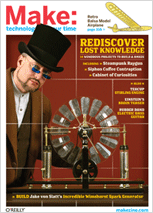

Today is the birthday of Joseph Priestley, the 18th century scientist, teacher, and political wonk who had a tremendous impact on the worlds of science and politics. He is credited with the discovery of oxygen (isolating it in its gaseous state).
Priestley has been the subject of two “recent” books, The Lunar Men (actually five years old), by Jenny Uglow, which I reviewed in MAKE Volume 17, and the recent The Invention of Air, by Steven Johnson. The Uglow book is about the Lunar Society, an amazing sort of Dorkbot of the late 18th century, whose membership rolls included Erasmus Darwin (Charles’ grandfather), Josiah Wedgewood, the industrializing potter, James Watt, perfecter of the steam engine, and many more giants of science and early industrialism. Steven’s book is a bio of Priestley and details his contributions to science, religion, and politics, and the significant, and frequently under-appreciated, influence he had on the founding ideals of America. In the book, Johnson points out that, for instance, in the 165 letters that passed between Thomas Jefferson and John Adams, the name Benjamin Franklin was mentioned five times, George Washington three times, and Alexander Hamilton twice. Joseph Priestley, a foreign immigrant, is cited no fewer than 52 times.
From the Wikipedia entry on Priestley:
Joseph Priestley (13 March 1733 (Old Style) – 6 February 1804) was an 18th-century British theologian, Dissenting clergyman, natural philosopher, educator, and political theorist who published over 150 works. He is usually credited with the discovery of oxygen, having isolated it in its gaseous state, although Carl Wilhelm Scheele and Antoine Lavoisier also have a claim to the discovery.
During his lifetime, Priestley’s considerable scientific reputation rested on his invention of soda water, his writings on electricity, and his discovery of several “airs” (gases), the most famous being what Priestley dubbed “dephlogisticated air” (oxygen). However, Priestley’s determination to defend phlogiston theory and to reject what would become the Chemical Revolution eventually left him isolated within the scientific community.
Priestley’s science was integral to his theology, and he consistently tried to fuse Enlightenment rationalism with Christian theism. In his metaphysical texts, Priestley attempted to combine theism, materialism, and determinism, a project that has been called “audacious and original”. He believed that a proper understanding of the natural world would promote human progress and eventually bring about the Christian Millennium. Priestley, who strongly believed in the free and open exchange of ideas, advocated toleration and equal rights for religious Dissenters, which also led him to help found Unitarianism in England. The controversial nature of Priestley’s publications combined with his outspoken support of the French Revolution aroused public and governmental suspicion; he was eventually forced to flee to the United States after a mob burned down his home and church in 1791.
A scholar and teacher throughout his life, Priestley also made significant contributions to pedagogy, including the publication of a seminal work on English grammar and the invention of modern historiography. These educational writings were some of Priestley’s most popular works. It was his metaphysical works, however, that had the most lasting influence: leading philosophers including Jeremy Bentham, John Stuart Mill, and Herbert Spencer credit them among the primary sources for utilitarianism.
Here’s the video of Steven Johnson’s recent appearance on The Colbert Report, talking about The Invention of Air:
.
.
.
From MAKE magazine:
Check out MAKE, Volume 17: The Lost Knowledge issue!

Buy your copy in the Maker Shed
Subscribe to MAKE
Access the Digital Edition (if you’re already a subscriber)
In Volume 17, MAKE goes really old school with the Lost Knowledge issue, featuring projects and articles covering the steampunk scene — makers creating their own alternative Victorian world through modified computers, phones, cars, costumes, and other fantastic creations. Projects include an elegant Wimshurst Influence Machine (an electrostatic generator built entirely from Home Depot parts), a Florence Siphon coffee brewer, and a teacup-powered Stirling engine. This special section also covers watchmaking, letterpress printing, the early multimedia art of William Blake, and other wondrous and lost (or fading) pre-20th-century technologies.
ADVERTISEMENT
Join Make: Community Today








